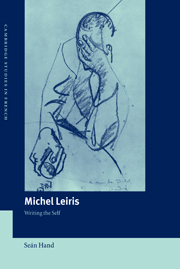Book contents
- Frontmatter
- Contents
- Acknowledgements
- List of abbreviations
- Introduction: the deaths of Michel Leiris
- PART I TEXTS AND CONTEXTS
- 1 Unities and identities: Leiris and surrealism
- 2 Recasting the self: from surrealism to ethnography
- 3 Autobiographical frameworks: from ethnography to L'Age d'homme
- 4 Positional play: La Règle du jeu
- 5 Secreting the self: Journal 1922–1989
- PART II THE QUEST FOR PRESENCE IN LA RÈGLE DU JEU
- Conclusion: locating Leiris
- Notes
- Bibliography
- Index
3 - Autobiographical frameworks: from ethnography to L'Age d'homme
Published online by Cambridge University Press: 22 October 2009
- Frontmatter
- Contents
- Acknowledgements
- List of abbreviations
- Introduction: the deaths of Michel Leiris
- PART I TEXTS AND CONTEXTS
- 1 Unities and identities: Leiris and surrealism
- 2 Recasting the self: from surrealism to ethnography
- 3 Autobiographical frameworks: from ethnography to L'Age d'homme
- 4 Positional play: La Règle du jeu
- 5 Secreting the self: Journal 1922–1989
- PART II THE QUEST FOR PRESENCE IN LA RÈGLE DU JEU
- Conclusion: locating Leiris
- Notes
- Bibliography
- Index
Summary
Leiris's ethnographic curriculum vitae, Titres et travaux, describes L'Afrique fantôme as ‘amorçant la série d'écrits autobiographiques qui représente le noyau de son oeuvre d'écrivain'. Certainly, upon his return from Africa, Leiris's work seemed to become more confident and focused, in contrast to the confused extremes of his intellectual milieux. He acted as the (anonymous) editor of the second issue of Minotaure, which recorded the intellectual and concrete findings of the Mission; and he contributed seven rather dutiful reviews of psychological and political literature to Bataille's La Critique sociale. But he took no part in Bataille's ‘Acéphale’, either in its textual form as a journal of Nietzschean enthusiasms, or in its lived version as a supposedly secret sect driven by mystical negativity. Nor did he contribute to the ‘equivocal’ politics of ‘Contre-Attaque’, whose proposed ‘surfasciste’ transcendence of both fascism and liberal democracy produced a short-lived reconciliation with Breton. Leiris's reticence is partly a question of temperament, but more fundamentally one of technique allied to vision. It was not mere expediency that later led Leiris to break with Bataille over the latter's insufficiently correct application of Durkheimian principles, within the activities of the Collège de sociologie.
- Type
- Chapter
- Information
- Michel LeirisWriting the Self, pp. 61 - 84Publisher: Cambridge University PressPrint publication year: 2002



